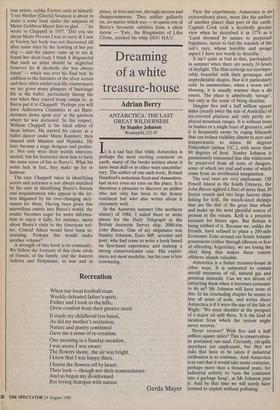Dreaming of a white treasure-house
Adrian Berry
ANTARCTICA: THE LAST GREAT WILDERNESS by Stanley Johnson Weidenfeld, £12.95 It is a sad fact that while Antarctica is perhaps the most exciting continent on earth, many of the books written about it have been dull or in other ways unsatisfac- tory. The author of one such work, Roland Huntford's notorious Scott and Amundsen, had never even set eyes on the place. It is therefore a pleasure to discover an author who not only has been to the frozen continent but who also writes about it extremely well.
In the Antarctic summer (the northern winter) of 1984, I sailed there to write pieces for the Daily Telegraph in the British Antarctic Survey ship, 2000-ton John Biscoe. One of my shipmates was Stanley Johnson, Euro MP, novelist and poet, who had come to write a book based on first-hand experience and making a strong conservationist case. His experi- ences are most readable, but his case is less convincing. First the experiences. Antarctica is an extraordinary place, more like the surface of another planet than part of the earth. Captain Cook took a decidedly gloomy view when he described it in 1774 as a 'Land doomed by nature to perpetual frigidness, never to feel the warmth of the sun's rays; whose horrible and savage aspect I have not words to describe.'
It isn't quite as bad as that, particularly in summer when there are nearly 24 hours of daylight. The blue icebergs are incompa- rably beautiful with their grotesque and unpredictable shapes. Nor is it particularly cold. In summertime, when a storm isn't blowing, it is usually warmer than a ski resort. The place is admittedly 'savage', but only in the sense of being desolate.
Imagine five and a half million square miles (nearly twice the size of Australia) of ice-covered plateaus and only partly ex- plored mountain ranges. It is without trees or bushes or a single trace of greenery, and it is frequently swept by raging blizzards that can reduce visibility almost to zero and temperatures to minus 60 degrees Fahrenheit (minus 51C.), with more than 90 degrees of frost. Stanley Johnson is passionately concerned that this wilderness be preserved from all sorts of dangers, some of which are real and some of which come from an overheated imagination.
The real ones are very unpleasant. Off Powell Island in the South Orkneys, the John Biscoe sighted a fleet of more than 30 Soviet vessels and two large factory ships fishing for krill, the match-sized shrimps that are the diet of the great blue whale and make up the most plentiful source of protein in the oceans. Krill is a priceless treasure for future ages. But Britain is being robbed of it. Because we, unlike the French, have refused to place a 200-mile Economic Zone around our South Atlantic possessions (either through idleness or fear of offending Argentina), we are losing the chief thing that makes these remote offshore islands valuable.
Antarctica is a future treasure-house in other ways. It is estimated to contain untold resources of oil, natural gas and precious minerals. Can we not dream of extracting them when it becomes economic to do so? Mr Johnson will have none of this. In his concluding chapter he seems to lose all sense of scale, and writes about Antarctica is if it were the size of the Isle of Wight: 'We must shudder at the prospect of a major oil spill there. It is the kind of incident from which the system might never recover.'
Never recover? With five and a half million square miles? This is conservation- ist sentiment run mad. Certainly, oil-spills anywhere are unpleasant, but they are risks that have to be taken if industrial civilisation is to continue. And Antarctica is so vast that it would take many centuries, perhaps more than a thousand years, for industrial activity to 'turn the continent into a garbage heap', as Mr Johnson puts it. And by that time we will surely have learned to exploit without polluting.










































 Previous page
Previous page